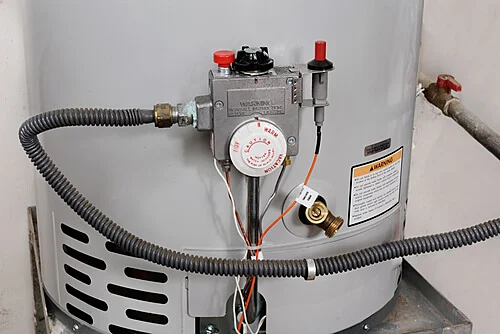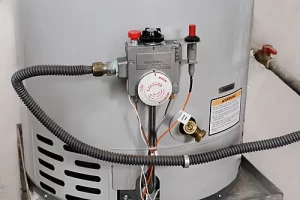Let’s talk about water heaters. Your water heater is one of the most expensive and important fixtures in your home, yet many homeowners never even think about theirs until there’s an emergency.
Today, we’ll go over a few basics to help you know if you should think about replacing yours, as well as some helpful tips.
How Old Is Your Water Heater?
The first thing you’ll want to look for is the age of the water heater. Your unit will probably have a few different labels on it, but the important one is usually plain and white or light gray. It’ll look something like the one here.
Usually (especially on newer units), the manufacture date will be printed as such right on the label. If not, you can usually figure it out by looking at the first four digits of the serial number.
The water heater associated with this label you can see was manufactured in January 1997 (0197). If your water heater is this old, it means that you’re very lucky–and that you should replace it as soon as possible. Most standard water heaters are warrantied for six years, and the average life expectancy is 10-12. If you’re in that range, it would be wise to keep an eye on it even if you’re not experiencing issues.
Signs of Water Heater Decay
Regardless of the age of your water heater, one sign that it’s likely near the end of its life is if you see rust-colored water coming out of your hot taps. This is a sign that the inside of the tank has rusted to the point of disintegration.
Note: it’s possible to have rust-colored water without a water heater issue, but it’s generally only found in older homes that still have galvanized steel water lines in some places.
Does Your Water Heater Have an Isolation Valve?
While you’re checking out your water heater, it’s also useful to note whether or not it has an isolation valve in case of an emergency. If you’re facing the front of your water heater, the cold/inlet pipe will be on the right and the hot/outlet pipe on the left. There should be a shutoff valve on the cold side, although not every unit is installed properly.
If you ever experience a catastrophic leak on your water heater, you can close that valve and isolate the unit along with all of your hot water lines. That way, you’ll at least still have cold water until you can have the water heater replaced.
And there you have it. There aren’t really any DIY tips for handling a water heater issue–the best thing to do is to call a professional if you have a problem. It’s good though to have a plan to replace your water heater when it goes out, as well as how you can keep your water on in the event of a leak.
Schedule a Plumber
Schedule a plumber if you need assistance, we are happy to help.
Read our reviews to learn more about us or our services.

